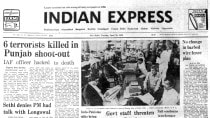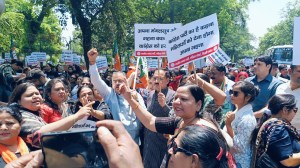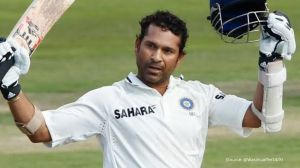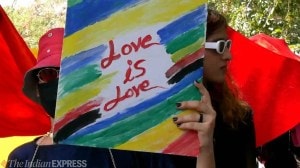- India
- International
Ram Vilas Paswan was an advocate of Mandal and coalition politics. Both face irrelevance
Paswan’s death is another reminder that the wheel is now coming around a full circle, both on “Mandal” and coalition politics, the two themes of the last 25 years, of which he was an advocate.
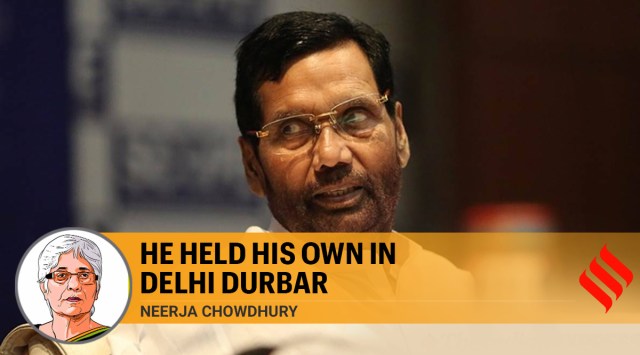 Paswan, who died in a Delhi hospital last week at the age of 74, had been a convinced proponent of Mandal and “social justice”.
Paswan, who died in a Delhi hospital last week at the age of 74, had been a convinced proponent of Mandal and “social justice”. It was August 6, 1990 in Delhi. Ministers were trooping into South Block for a Cabinet meeting which was to change the political dynamics of North India. Half an hour later, Prime Minister V P Singh turned to Ram Vilas Paswan, his minister for social welfare, and asked him to move the proposal to bring 27 per cent reservation in government jobs for socially and educationally backward classes. While some of the bureaucrats looked up in surprise — for this was not part of the agenda — Paswan launched forth into his speech. He made a case for the implementation of the Mandal Commission’s report for OBC reservations which had been languishing in some forgotten almirah since 1980.
Paswan, who died in a Delhi hospital last week at the age of 74, had been a convinced proponent of Mandal and “social justice”. He spoke about it long before V P Singh, or Sharad Yadav or others got around to it. But he was not its beneficiary in Bihar. That space was taken over by Lalu Prasad and Nitish Kumar.
Mandal unleashed forces which devoured the V P Singh government, changed power equations, spawned a new breed of OBC leaders who went on to rule North India in the quarter century afterwards, like Mulayam Singh Yadav, Lalu Prasad, Nitish Kumar, Shivraj Chouhan, Uma Bharati, Kalyan Singh and Ashok Gehlot. Though Narendra Modi came to power in 2014 on “vikas” and Hindutva, an underlying theme of his victory was his OBC credentials — that for the first time an OBC leader would be becoming prime minister. Paswan’s death has created a piquant situation for the NDA government. It is left without any Cabinet-level minister, from its allies, after the exit of the Akali Dal and earlier of the Shiv Sena.
The second major shift in politics of which Paswan became an accidental “chehra” had to do with alliances which, like reservation, threw up coalition politics. In early 2004, Sonia Gandhi walked across from 10, Janpath, to Paswan’s home, seeking to join hands with him in the general election that followed. He was the first non-Congress leader she reached out to in an attempt to sew up alliances, shedding the Congress’s go-it-alone policy. The alliances she forged in early 2004 catapulted the Congress to power for 10 years at the head of the United Progressive Alliance of which Paswan was a minister. Sonia looked at him with favour because he had left Vajpayee’s NDA government as minister after the 2002 riots in Gujarat.
In later years, Paswan used to say that going with the Congress was a major mistake, for he was thrown at the mercy of the party’s Bihar leaders, and that he should have launched his regional party earlier, rather than waiting for 2000, when he formed the Lok Janshakti Party.

Not all are able to recognise their political limitations, as Paswan did. The realist that he was, he decided to concentrate on national politics, when he could not break into the Bihar landscape as he had wanted to. Like Jagjivan Ram, he became a Dalit face at the Centre, in his case under six prime ministers, V P Singh, H D Deve Gowda, I K Gujral, Atal Bihari Vajpayee, Manmohan Singh and Narendra Modi. That he managed to retain his relevance in six governments, despite the support only amongst a section of the Dalits and that too in one state of India, spoke volumes about his political savvy. In the eighties and the nineties, there were two political weathercocks who used to be talked about, who could sense which way the wind was blowing — Ram Vilas Paswan and Sitaram Kesri!
In private, Paswan would concede that he had had to compromise on his earlier ideals to be able to survive in parliamentary politics where money, MPship and ministership determine a political role or relevance. Whenever you visited him, there would be at least 40-50 people hanging around at his residence to get some work done, and he believed in the adage, “Logon ke kaam karte raho”.
Paswan had started his political journey on a different note — first by winning an assembly seat in 1969, on the Samyukta Socialist Party ticket, brought up as he was on the ideals of Ram Manohar Lohia and Karpoori Thakur. He was one of the six who had resigned his assembly seat in 1974 when JP gave his call for a “total revolution” and became a hero for many in Bihar. His stature grew further when he won by a record 5 lakh votes from Hajipur at the end of the Emergency, during which he was imprisoned.
V P Singh used to say that he would one day become prime minister. Unlike Kanshi Ram who was ambivalent about “Mandal” which empowered the OBCs, Paswan was for a social tie-up between the OBCs and the Dalits (and Muslims and women), on the lines of the SSP’s battlecry: “Sansopa (SSP) ne bandhi gaanth, pichhda pave sau mein saath.”
Paswan’s death is another reminder that the wheel is now coming around a full circle, both on “Mandal” and coalition politics, the two themes of the last 25 years, of which he was an advocate. However, both caste and alliances remain factors in states, particularly in Bihar, where elections are scheduled from October 28.
How will history judge Ram Vilas Paswan? A Mandal proponent who wanted “satta mein shirkat” for all those kept out of the power structure? “A disappointed social reformer”, as a socialist friend of yesteryears put it? “A populist democrat?” Or a Dalit leader who managed to hold his own in the Delhi durbar?
The writer is a senior journalist
EXPRESS OPINION
More Explained
Apr 24: Latest News
- 01
- 02
- 03
- 04
- 05











